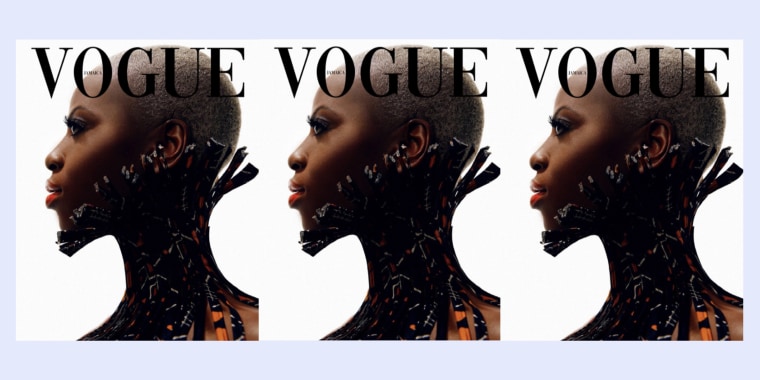Vogue editor-in-chief Anna Wintour pledged in a letter to staff this week that her publication will “do better” when it comes to featuring Black models and photographers. In the meantime, Black artists on social media are giving a beautiful preview of what that diversity could look like.
In the #VogueChallenge, Black photographers and designers have been creating mock-up Vogue covers featuring Black models, and the results are stunning.
Salma Noor, a student and aspiring model based in Oslo, Norway, created the viral hashtag.
“My inspiration for this challenge was the lack of representation of black people that looked like me on the front cover of magazines,” she told TODAY Style in an email. “In light of recent events in America with the topic of race, I felt like it was the right moment to post an edit of me on the cover of Vogue.”
After she posted her cover, other artists around the world took up the challenge, including Rooful Ali, a photographer based in Northamptonshire, United Kingdom.
He created several covers featuring Black models, as well as other models of color, wearing hijabs.
Ali, who said on Instagram that he would love to be the “first British, Muslim, male Bengali” to shoot a Vogue cover featuring a person of color, told TODAY that the so-called fashion bible “could always do more when it comes to diversity.”
“Obviously, currently it's a big thing in terms of Black Lives Matter, but it shouldn't have (just) been currently. It should have been since obviously day one,” he said. “They should have ensured that there was more diversity, both in front of the lens in terms of the subjects, the models and the designers or celebrities, but also behind the lens.”
Ali is one of the many professional photographers who rose to the #VogueChallenge. Photographer Albert Chime created a series of swimsuit covers and also suggested a new international edition of the magazine: Vogue Ghana.
“Let’s pretend this was real cos a black photographer from Africa can only dream of this,” he wrote on Instagram. “But soon everything is going to make sense.”
Jamaica-based stylist and designer Bootleg Rocstar also created multiple Vogue covers, shot by photographer Wade Rhoden.
Other people put their own spin on the challenge, editing photos of Black models onto different magazines, including Essence and Jet.
In the midst of ongoing global protests about racial injustice, Anna Wintour sent an email to Vogue staffers on June 9, holding herself accountable for a lack of diversity at the publication over the years.
She said she wanted to start “by acknowledging your feelings and expressing my empathy towards what so many of you are going through: sadness, hurt, and anger too,” read her email obtained by TODAY.
"I want to say this especially to the Black members of our team — I can only imagine what these days have been like," she wrote. "But I also know that the hurt, and violence, and injustice we’re seeing and talking about have been around for a long time. Recognizing it and doing something about it is overdue."
The next day, the New York Times published an article highlighting the "reckoning" at Conde Nast, Vogue's publisher where Wintour is artistic director.
Ali, the UK-based photographer who participated in the #VogueChallenge, said he was encouraged by Wintour’s apology, but said the “proof will be in the pudding” when it comes to magazines making real, long-term changes.
“It's inevitably a brave statement to come out with to say, you know what, I'm going to stand out and to stand up for causes,” he said.
But he added that time will tell whether “words are actually turned into actions,” and said he doesn’t want to see “tokenism for the sake of it.”
“If it's just literally seen as a fad and a trend, I think one year down the line, there's no real change,” he said.
Noor, the creator of the challenge, agrees.
“It was nice to see that (Wintour) acknowledged the lack of diversity, but we would like to see this change in the future,” she said.
She added that it’s important for young people of color to see themselves represented on the prestigious Vogue cover.
“It means hope,” she said. “It gives us motivation to see that we can do things just like everyone regardless of the color of our skin. Beauty comes in all ethnicities and for us to be on the same platform as everyone else helps us see that.”
